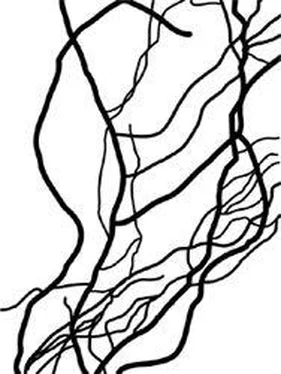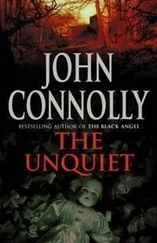She tapped her finger on the map, right on the location of Wreckit & Sons.
A small troop of Christmas elves crossed their path, forcing Professor Hilbert to brake suddenly.
“You don’t want to try talking to them as well, do you?” said Maria.
“Don’t be silly,” said Professor Stefan. “They’re elves.”
“Of course,” said Maria. “Duh.”
The elves paid them no notice. They were too busy running from something. Seconds later, one of the groundskeepers appeared. He was carrying a heavy rake, but was still making good progress. He caught up with the elves just as they reached the other side of the road, and began beating them to splinters.
“The sign said,” he screamed, “ ‘KEEP OFF THE GRASS.’ What part of keeping off the grass did you— Bang!— not— Smash!— understand— Thud! ?”
When the elves were no more, the groundskeeper looked up to see five people watching him. He tipped his hat at them.
“Evening,” he said.
“Evening,” replied Professor Hilbert.
The groundskeeper indicated with a thumb the stack of firewood and splinters that had once been elves.
“Elves,” he said. “They trampled on the grass.”
“So we gathered.”
“And the flower beds,” added the groundskeeper. His tone suggested that, while some might feel reducing elves to kindling for trespassing on the grass was a bit of an overreaction, no sane person could take issue with pummeling them for stepping on the flower beds.
He wiped his sweating brow.
“I quite enjoyed that,” he said. “I think I’ll go and look for some more of them.”
And off he went, whistling what sounded like “Heigh-Ho, Heigh-Ho.”
It struck Professor Hilbert that, if the groundskeeper was anything to go by, the citizens of Biddlecombe were taking the evening’s events in their stride. This view was confirmed when they came across the Biddlecombe Ladies’ Football Team standing by half a dozen large and very bruised Christmas-tree fairies who had been tied to tree trunks with stout rope in order to prevent them from doing any further harm.
Professor Hilbert stopped the car.
“What are you doing?” said Professor Stefan.
“Look!” said Professor Hilbert, pointing to the west.
There was a faint shimmer to the air. Beyond it Maria could see more trees and, some way in the distance, the spire of the church in the nearest village, Rathford, but it was as though a mist had descended upon the landscape, blurring the image. It struck Maria that they shouldn’t even have been able to see Rathford. It was nighttime, and yet the spire of the Church of St. Roger the Inflammable was plainly visible, although there was a touch of shiny gray to it, like an old photographic negative.
Professor Hilbert stepped from the car and walked toward the location of the shimmering. The others followed, even Brian, although he was not so much curious as frightened to be left alone. As they drew closer, they saw that the ground came to a kind of end at the fence surrounding August Derleth Park. Beyond the boundary it was less actual firm ground than the memory of it, and its level didn’t quite match the grass on their side of the fence. Worse, the other ground was transparent, and beneath it Maria could see a terrible blackness spotted with the odd lonely star. It felt to her as though Biddlecombe had somehow been set adrift in the Multiverse while still bringing with it the memory of the planet of which it had once been a part. The dividing line was the shimmering, like the heat haze that rises from the ground on sunny summer days, except this one brought with it no warmth.
Reginald/Dorothy reached out to touch it, and only Professor Hilbert’s sudden grip on his/her wrist prevented him/her from doing so. 48
“I wouldn’t,” he said.
Reginald withdrew her hand. Professor Hilbert’s fingers tingled after touching her. It must be the power of the boundary, he thought.
“How can we see Rathford?” asked Maria. “We shouldn’t be able to. It’s night, and anyway Rathford is quite far from Biddlecombe. We can’t even see the church spire during the day.”
“You can see a Rathford,” said Professor Hilbert. “It’s one of an infinite number of Rathfords, or it may be the point at which all of those potential Rathfords are bound together until a decision is made on which one should come into being.”
“We’ve become unmoored from reality,” said Professor Stefan. “I believe that a dimensional shift has occurred, and we’re just fractionally off-kilter with the rest of the Multiverse.”
“But what’s on the other side of that boundary?” said Brian.
“Perhaps a version of Rathford, once you bring it into being by its observation, or nothing at all,” said Professor Hilbert. “Then again, you might thrust your fingers into another dimension, and who knows what could be waiting on the other side? Or your fingers might end up between dimensions, which could be just as bad. It might be like wearing fingerless gloves in space, which would be very unwise.” 49
“Did we do this?” asked Brian. “I mean, all that fiddling around with particle accelerators and the nature of reality: could it have caused this?”
Professor Hilbert found something interesting to look at beside his right foot. Professor Stefan whistled and peered at the fathomless depths of space.
Eventually Professor Hilbert said, “This is not the time to go around blaming people for what may or may not have happened, Brian.”
“When would be a good time, Professor Hilbert?” said Brian.
“When I’m not here,” said Professor Hilbert, “but preferably when I’m dead and can’t get into any trouble. I’d advise you to think very hard about your part in all of this as well, young Brian. You’re an important part of our team, which means that you can be blamed, too.”
“But I only made the tea!” said Brian.
“Yes, but it was very good tea,” said Professor Hilbert. “If it had been bad tea, then we might not have been so productive, and none of this might have happened or, if it did, then it might have happened much more slowly.”
“Don’t forget the biscuits,” Professor Stefan chimed in.
“Oh yes, the biscuits,” said Professor Hilbert. “Don’t get me started on the biscuits. All I can say is that you’re up to your neck in this, Brian, mark my words. If the world comes to an end because of our experiments, you’ll be in big trouble. They’ll throw the book at you, or they will if there’s anyone still around to throw books, or anything else, which there probably won’t be. You know, now that I come to think about it, everything is fine at our end. If the world doesn’t get destroyed, we’re free and clear, and if it does end, then there’s not much anybody can do to make us feel bad about it.”
Professor Hilbert smiled happily.
“There, glad that’s sorted out. Still, all things considered, it would be nice if we could prevent the end of the world from happening. With that in mind, onward we go.”
He began to lead them back to the car. Brian didn’t move. He just stood where he was, looking confused.
“But I only made the tea,” he said.
Professor Stefan steered him toward the car.
“Never mind,” he said. “Try looking on the bright side.”
“Is there one?”
“Not really.”
“Oh.”
“But if you come up with one, do let us know, won’t you?”
And high above their heads the stars were swallowed, one by one.
47. Boadicea was the queen of the Iceni tribe in Britain who led a rebellion against the Roman Empire in A.D. 60 or 61. Three settlements were destroyed during her war, including the young city of Londinium, or London. She was finally defeated in a battle in the West Midlands, but died without being captured. The Roman historian Dio said of her that she was “possessed of greater intelligence than often belongs to women.” Mind you, he said that after she was safely dead and gone, otherwise she’d have cut his head off and stuck it on a spike for saying stupid things about women.
Читать дальше












